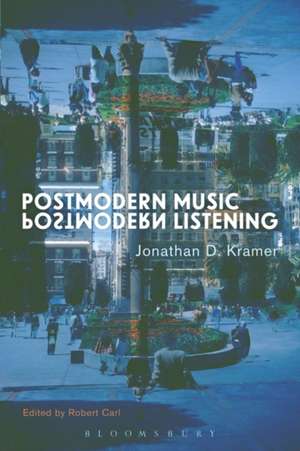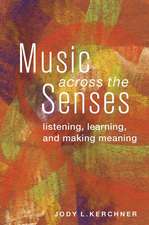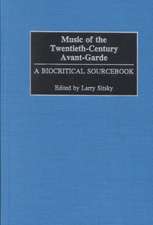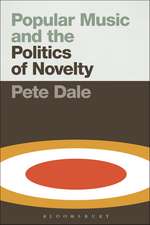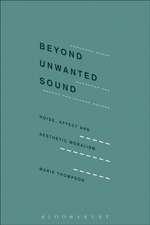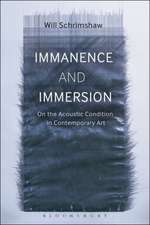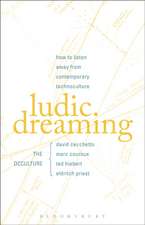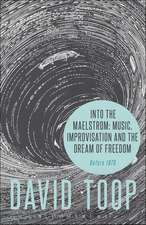Postmodern Music, Postmodern Listening
Autor Jonathan D. Kramer Editat de Professor of Composition Robert Carlen Limba Engleză Hardback – 10 aug 2016
| Toate formatele și edițiile | Preț | Express |
|---|---|---|
| Paperback (1) | 243.25 lei 43-57 zile | |
| Bloomsbury Publishing – 10 aug 2016 | 243.25 lei 43-57 zile | |
| Hardback (1) | 836.31 lei 43-57 zile | |
| Bloomsbury Publishing – 10 aug 2016 | 836.31 lei 43-57 zile |
Preț: 836.31 lei
Preț vechi: 1069.33 lei
-22% Nou
Puncte Express: 1254
Preț estimativ în valută:
160.02€ • 167.53$ • 132.41£
160.02€ • 167.53$ • 132.41£
Carte tipărită la comandă
Livrare economică 07-21 aprilie
Preluare comenzi: 021 569.72.76
Specificații
ISBN-13: 9781501306020
ISBN-10: 1501306022
Pagini: 400
Dimensiuni: 152 x 229 x 28 mm
Greutate: 0.75 kg
Editura: Bloomsbury Publishing
Colecția Bloomsbury Academic
Locul publicării:New York, United States
ISBN-10: 1501306022
Pagini: 400
Dimensiuni: 152 x 229 x 28 mm
Greutate: 0.75 kg
Editura: Bloomsbury Publishing
Colecția Bloomsbury Academic
Locul publicării:New York, United States
Caracteristici
Explains how composers throughout music history have mixed and contrasted different elements in their music, and created a model for what we now call "postmodern"
Notă biografică
Robert Carl is chair of Composition at the Hartt School, University of Hartford. His music is performed worldwide. His first teacher was Jonathan Kramer.
Cuprins
Editor's Introduction by Robert CarlPreface by Jann PaslerAcknowledgementsForeword BOOK 1. IDEASPART I. CHAPTERS ON POSTMODERN CONCEPTS OF MUSICChapter 1: The Nature and Origins of Musical Postmodernism Chapter 2: Postmodernism (Not) Defined Chapter 3: Modernism, Postmodernism, the Avant Garde, and Their AudiencesPART II. CHAPTERS ON CONCEPTS OF POSTMODERN MUSICChapter 4: Postmodernism and Related Isms in Today's Music Chapter 5: Unity, Organicism, and Challenges to Their UbiquityChapter 6: Beyond UnityChapter 7: Postmodern ListeningChapter 8: Postmodern Musical TimeChapter 9: Surrealism, Neoclassicism, and PostmodernismPART III. POSTMODERN CHAPTERS ON THE CONCEPT OF MUSICChapter 10: Economics, Politics, Technology, and AppropriationChapter 11: Beyond the Beyond: Postmodernism ExemplifiedBOOK II. CASE HISTORIESChapter 12: Postmodernism in the Finale of Mahler's Seventh Symphony Chapter 13: Unity and Disunity in Nielsen's Sixth SymphonyBOOK III. ESSAYS ON POSTMODERNISM AND JONATHAN KRAMEREditor's note1. Postmodern Musings, Postmodern Performing by Deborah Bradley-Kramer2. Are We Postmodern Yet? By Brad Garton3. Music in the Anthropocene by John Luther Adams4. On (re-) Hearing Kramer: Five Reactions to Postmodernism Music, Postmodern Listening by John Halle5. Uncommon Kindness: Reflections on Jonathan Kramer by Duncan Neilson6. Kramer Post Kramer by Martin BresnickBiographiesBibliographyIndex
Recenzii
The value and importance of the book is properly expressed in the conclusion of the preface by Jann Pasler ... Indeed a deep reading of this book will provoke an objective critical relationship towards postmodernism even among those (like myself) who cautiously use this term - if they use it at all.
Jonathan Kramer's Postmodern Music, Postmodern Listening reflects his voracious mind and offers the reader a highly original tour through the philosophy, aesthetics, and analysis of musical postmodernism. The book is both accessible and authoritative, and it fills an important gap in the musical literature.
A brilliant "both/and," inclusive thinker, Jonathan Kramer has always been accessible and engaging, eclectic and learned. As a consummate writer, teacher and composer, he has astutely theorized postmodernism-that slippery, contentious beast-from the evidence of contemporary music itself and from the social values of its listeners, as well as creators. In this multi-layered, innovative study of music in our world of "social saturation", the postmodern is neither a category nor an era: it is a way of hearing, a musical attitude shared by composers and listeners alike. This captivating book will make you rethink modernism, anti-modernism, and of course postmodernism.
For years Jonathan Kramer has been the leading thinker on the vexed subject of postmodernism in music through his articles and lectures. Now his long-awaited book on the topic is finally posthumously out, and the subtlety and nuance with which he draws a consistent and reasonable argument from so much disparate and seemingly contradictory data is breathtaking. This is likely to be the standard work on musical postmodernism for a long time, and will vastly increase the depth of the discussion.
Jonathan Kramer's Postmodern Music, Postmodern Listening reflects his voracious mind and offers the reader a highly original tour through the philosophy, aesthetics, and analysis of musical postmodernism. The book is both accessible and authoritative, and it fills an important gap in the musical literature.
A brilliant "both/and," inclusive thinker, Jonathan Kramer has always been accessible and engaging, eclectic and learned. As a consummate writer, teacher and composer, he has astutely theorized postmodernism-that slippery, contentious beast-from the evidence of contemporary music itself and from the social values of its listeners, as well as creators. In this multi-layered, innovative study of music in our world of "social saturation", the postmodern is neither a category nor an era: it is a way of hearing, a musical attitude shared by composers and listeners alike. This captivating book will make you rethink modernism, anti-modernism, and of course postmodernism.
For years Jonathan Kramer has been the leading thinker on the vexed subject of postmodernism in music through his articles and lectures. Now his long-awaited book on the topic is finally posthumously out, and the subtlety and nuance with which he draws a consistent and reasonable argument from so much disparate and seemingly contradictory data is breathtaking. This is likely to be the standard work on musical postmodernism for a long time, and will vastly increase the depth of the discussion.
